Contemporary Hospitality Industry: Operations and Skill Gaps Report
VerifiedAdded on 2023/01/11
|9
|2295
|91
Report
AI Summary
This report provides a comprehensive analysis of the contemporary hospitality industry, focusing on the diverse types of businesses within it, such as accommodation, food and beverage, and entertainment. The report uses Palace Hotels as a case study, examining its operational and functional departments, including marketing, finance, and customer service, and the interrelationships between them. It also evaluates the contribution of the hospitality industry to local, national, and international economies, highlighting the impact of franchising and licensing agreements on global growth. Furthermore, the report delves into operational roles in the Asian hospitality industry, such as managers, event planners, and chefs, and the skills required for these roles. It identifies current skill shortages, particularly in customer service and multilingual abilities, and discusses the impact of these skill gaps and potential solutions, such as targeted training and recruitment strategies.
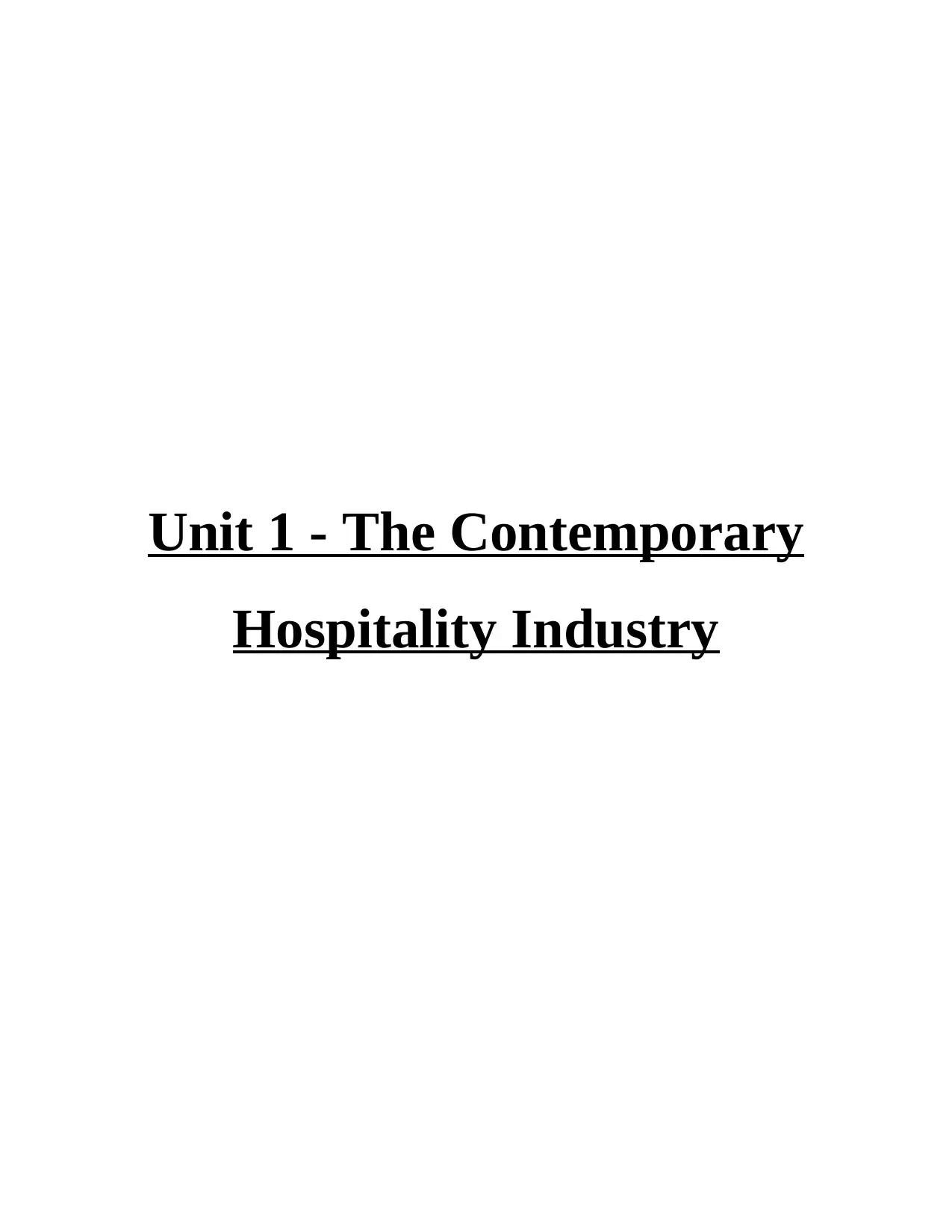
Unit 1 - The Contemporary
Hospitality Industry
Hospitality Industry
Paraphrase This Document
Need a fresh take? Get an instant paraphrase of this document with our AI Paraphraser
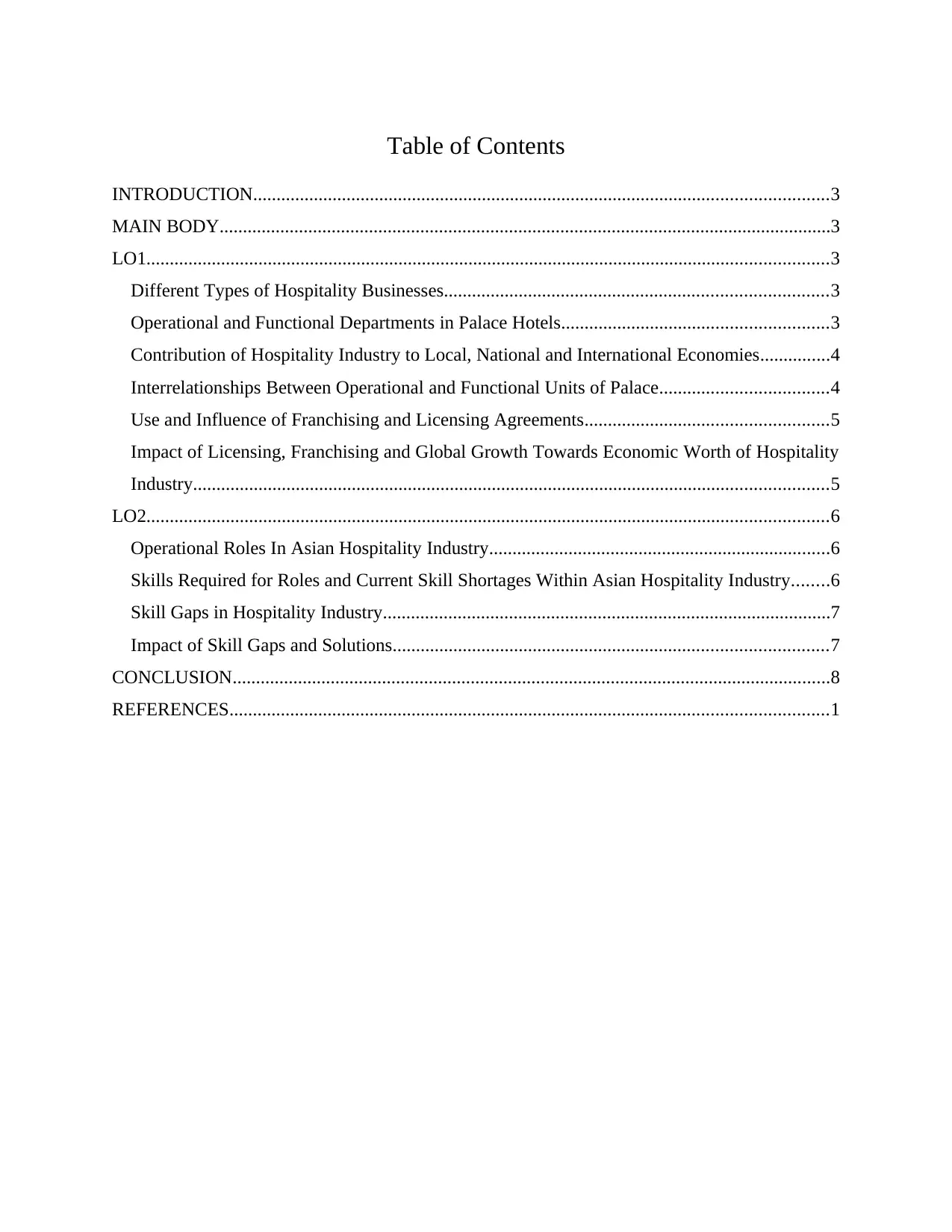
Table of Contents
INTRODUCTION...........................................................................................................................3
MAIN BODY...................................................................................................................................3
LO1..................................................................................................................................................3
Different Types of Hospitality Businesses..................................................................................3
Operational and Functional Departments in Palace Hotels.........................................................3
Contribution of Hospitality Industry to Local, National and International Economies...............4
Interrelationships Between Operational and Functional Units of Palace....................................4
Use and Influence of Franchising and Licensing Agreements....................................................5
Impact of Licensing, Franchising and Global Growth Towards Economic Worth of Hospitality
Industry........................................................................................................................................5
LO2..................................................................................................................................................6
Operational Roles In Asian Hospitality Industry.........................................................................6
Skills Required for Roles and Current Skill Shortages Within Asian Hospitality Industry........6
Skill Gaps in Hospitality Industry................................................................................................7
Impact of Skill Gaps and Solutions.............................................................................................7
CONCLUSION................................................................................................................................8
REFERENCES................................................................................................................................1
INTRODUCTION...........................................................................................................................3
MAIN BODY...................................................................................................................................3
LO1..................................................................................................................................................3
Different Types of Hospitality Businesses..................................................................................3
Operational and Functional Departments in Palace Hotels.........................................................3
Contribution of Hospitality Industry to Local, National and International Economies...............4
Interrelationships Between Operational and Functional Units of Palace....................................4
Use and Influence of Franchising and Licensing Agreements....................................................5
Impact of Licensing, Franchising and Global Growth Towards Economic Worth of Hospitality
Industry........................................................................................................................................5
LO2..................................................................................................................................................6
Operational Roles In Asian Hospitality Industry.........................................................................6
Skills Required for Roles and Current Skill Shortages Within Asian Hospitality Industry........6
Skill Gaps in Hospitality Industry................................................................................................7
Impact of Skill Gaps and Solutions.............................................................................................7
CONCLUSION................................................................................................................................8
REFERENCES................................................................................................................................1
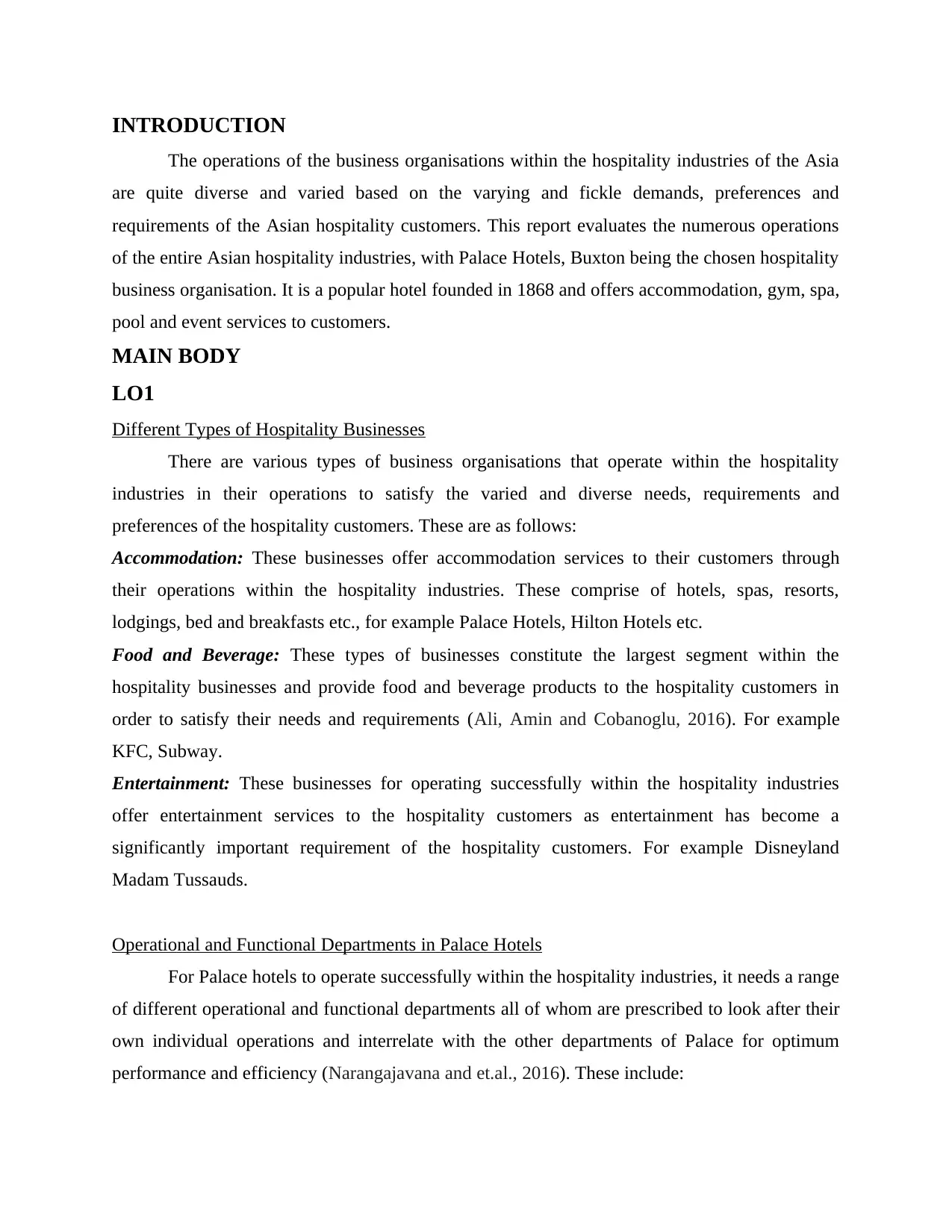
INTRODUCTION
The operations of the business organisations within the hospitality industries of the Asia
are quite diverse and varied based on the varying and fickle demands, preferences and
requirements of the Asian hospitality customers. This report evaluates the numerous operations
of the entire Asian hospitality industries, with Palace Hotels, Buxton being the chosen hospitality
business organisation. It is a popular hotel founded in 1868 and offers accommodation, gym, spa,
pool and event services to customers.
MAIN BODY
LO1
Different Types of Hospitality Businesses
There are various types of business organisations that operate within the hospitality
industries in their operations to satisfy the varied and diverse needs, requirements and
preferences of the hospitality customers. These are as follows:
Accommodation: These businesses offer accommodation services to their customers through
their operations within the hospitality industries. These comprise of hotels, spas, resorts,
lodgings, bed and breakfasts etc., for example Palace Hotels, Hilton Hotels etc.
Food and Beverage: These types of businesses constitute the largest segment within the
hospitality businesses and provide food and beverage products to the hospitality customers in
order to satisfy their needs and requirements (Ali, Amin and Cobanoglu, 2016). For example
KFC, Subway.
Entertainment: These businesses for operating successfully within the hospitality industries
offer entertainment services to the hospitality customers as entertainment has become a
significantly important requirement of the hospitality customers. For example Disneyland
Madam Tussauds.
Operational and Functional Departments in Palace Hotels
For Palace hotels to operate successfully within the hospitality industries, it needs a range
of different operational and functional departments all of whom are prescribed to look after their
own individual operations and interrelate with the other departments of Palace for optimum
performance and efficiency (Narangajavana and et.al., 2016). These include:
The operations of the business organisations within the hospitality industries of the Asia
are quite diverse and varied based on the varying and fickle demands, preferences and
requirements of the Asian hospitality customers. This report evaluates the numerous operations
of the entire Asian hospitality industries, with Palace Hotels, Buxton being the chosen hospitality
business organisation. It is a popular hotel founded in 1868 and offers accommodation, gym, spa,
pool and event services to customers.
MAIN BODY
LO1
Different Types of Hospitality Businesses
There are various types of business organisations that operate within the hospitality
industries in their operations to satisfy the varied and diverse needs, requirements and
preferences of the hospitality customers. These are as follows:
Accommodation: These businesses offer accommodation services to their customers through
their operations within the hospitality industries. These comprise of hotels, spas, resorts,
lodgings, bed and breakfasts etc., for example Palace Hotels, Hilton Hotels etc.
Food and Beverage: These types of businesses constitute the largest segment within the
hospitality businesses and provide food and beverage products to the hospitality customers in
order to satisfy their needs and requirements (Ali, Amin and Cobanoglu, 2016). For example
KFC, Subway.
Entertainment: These businesses for operating successfully within the hospitality industries
offer entertainment services to the hospitality customers as entertainment has become a
significantly important requirement of the hospitality customers. For example Disneyland
Madam Tussauds.
Operational and Functional Departments in Palace Hotels
For Palace hotels to operate successfully within the hospitality industries, it needs a range
of different operational and functional departments all of whom are prescribed to look after their
own individual operations and interrelate with the other departments of Palace for optimum
performance and efficiency (Narangajavana and et.al., 2016). These include:
⊘ This is a preview!⊘
Do you want full access?
Subscribe today to unlock all pages.

Trusted by 1+ million students worldwide
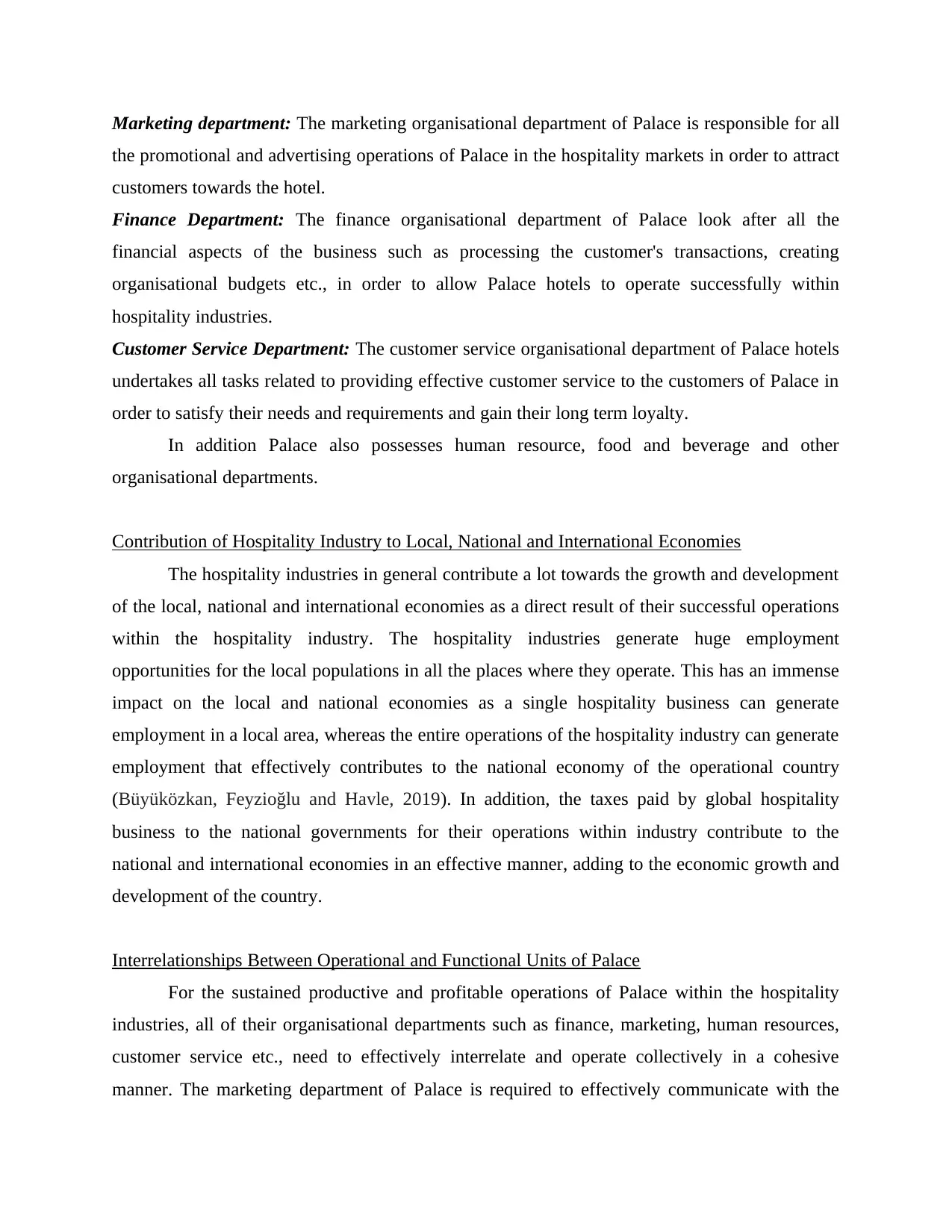
Marketing department: The marketing organisational department of Palace is responsible for all
the promotional and advertising operations of Palace in the hospitality markets in order to attract
customers towards the hotel.
Finance Department: The finance organisational department of Palace look after all the
financial aspects of the business such as processing the customer's transactions, creating
organisational budgets etc., in order to allow Palace hotels to operate successfully within
hospitality industries.
Customer Service Department: The customer service organisational department of Palace hotels
undertakes all tasks related to providing effective customer service to the customers of Palace in
order to satisfy their needs and requirements and gain their long term loyalty.
In addition Palace also possesses human resource, food and beverage and other
organisational departments.
Contribution of Hospitality Industry to Local, National and International Economies
The hospitality industries in general contribute a lot towards the growth and development
of the local, national and international economies as a direct result of their successful operations
within the hospitality industry. The hospitality industries generate huge employment
opportunities for the local populations in all the places where they operate. This has an immense
impact on the local and national economies as a single hospitality business can generate
employment in a local area, whereas the entire operations of the hospitality industry can generate
employment that effectively contributes to the national economy of the operational country
(Büyüközkan, Feyzioğlu and Havle, 2019). In addition, the taxes paid by global hospitality
business to the national governments for their operations within industry contribute to the
national and international economies in an effective manner, adding to the economic growth and
development of the country.
Interrelationships Between Operational and Functional Units of Palace
For the sustained productive and profitable operations of Palace within the hospitality
industries, all of their organisational departments such as finance, marketing, human resources,
customer service etc., need to effectively interrelate and operate collectively in a cohesive
manner. The marketing department of Palace is required to effectively communicate with the
the promotional and advertising operations of Palace in the hospitality markets in order to attract
customers towards the hotel.
Finance Department: The finance organisational department of Palace look after all the
financial aspects of the business such as processing the customer's transactions, creating
organisational budgets etc., in order to allow Palace hotels to operate successfully within
hospitality industries.
Customer Service Department: The customer service organisational department of Palace hotels
undertakes all tasks related to providing effective customer service to the customers of Palace in
order to satisfy their needs and requirements and gain their long term loyalty.
In addition Palace also possesses human resource, food and beverage and other
organisational departments.
Contribution of Hospitality Industry to Local, National and International Economies
The hospitality industries in general contribute a lot towards the growth and development
of the local, national and international economies as a direct result of their successful operations
within the hospitality industry. The hospitality industries generate huge employment
opportunities for the local populations in all the places where they operate. This has an immense
impact on the local and national economies as a single hospitality business can generate
employment in a local area, whereas the entire operations of the hospitality industry can generate
employment that effectively contributes to the national economy of the operational country
(Büyüközkan, Feyzioğlu and Havle, 2019). In addition, the taxes paid by global hospitality
business to the national governments for their operations within industry contribute to the
national and international economies in an effective manner, adding to the economic growth and
development of the country.
Interrelationships Between Operational and Functional Units of Palace
For the sustained productive and profitable operations of Palace within the hospitality
industries, all of their organisational departments such as finance, marketing, human resources,
customer service etc., need to effectively interrelate and operate collectively in a cohesive
manner. The marketing department of Palace is required to effectively communicate with the
Paraphrase This Document
Need a fresh take? Get an instant paraphrase of this document with our AI Paraphraser
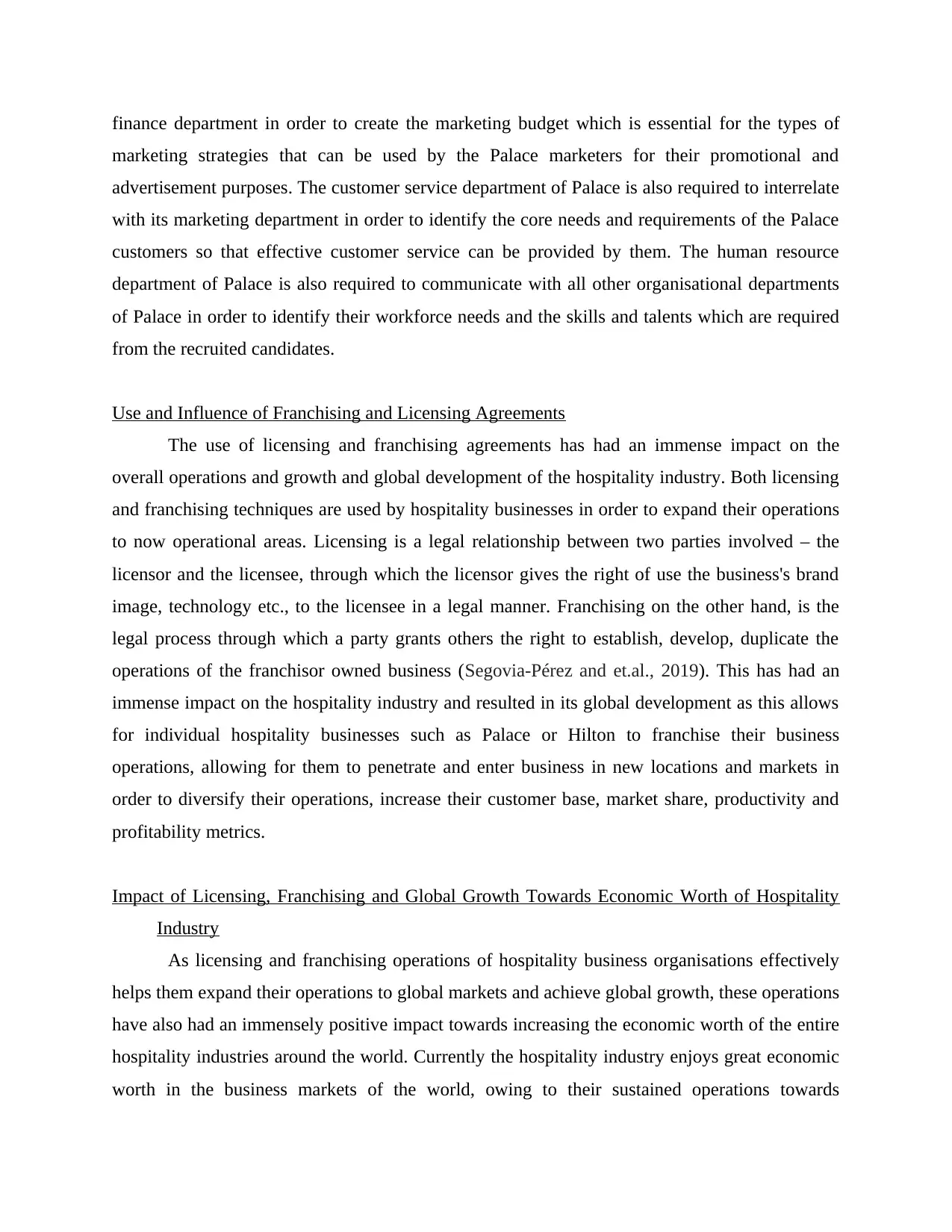
finance department in order to create the marketing budget which is essential for the types of
marketing strategies that can be used by the Palace marketers for their promotional and
advertisement purposes. The customer service department of Palace is also required to interrelate
with its marketing department in order to identify the core needs and requirements of the Palace
customers so that effective customer service can be provided by them. The human resource
department of Palace is also required to communicate with all other organisational departments
of Palace in order to identify their workforce needs and the skills and talents which are required
from the recruited candidates.
Use and Influence of Franchising and Licensing Agreements
The use of licensing and franchising agreements has had an immense impact on the
overall operations and growth and global development of the hospitality industry. Both licensing
and franchising techniques are used by hospitality businesses in order to expand their operations
to now operational areas. Licensing is a legal relationship between two parties involved – the
licensor and the licensee, through which the licensor gives the right of use the business's brand
image, technology etc., to the licensee in a legal manner. Franchising on the other hand, is the
legal process through which a party grants others the right to establish, develop, duplicate the
operations of the franchisor owned business (Segovia-Pérez and et.al., 2019). This has had an
immense impact on the hospitality industry and resulted in its global development as this allows
for individual hospitality businesses such as Palace or Hilton to franchise their business
operations, allowing for them to penetrate and enter business in new locations and markets in
order to diversify their operations, increase their customer base, market share, productivity and
profitability metrics.
Impact of Licensing, Franchising and Global Growth Towards Economic Worth of Hospitality
Industry
As licensing and franchising operations of hospitality business organisations effectively
helps them expand their operations to global markets and achieve global growth, these operations
have also had an immensely positive impact towards increasing the economic worth of the entire
hospitality industries around the world. Currently the hospitality industry enjoys great economic
worth in the business markets of the world, owing to their sustained operations towards
marketing strategies that can be used by the Palace marketers for their promotional and
advertisement purposes. The customer service department of Palace is also required to interrelate
with its marketing department in order to identify the core needs and requirements of the Palace
customers so that effective customer service can be provided by them. The human resource
department of Palace is also required to communicate with all other organisational departments
of Palace in order to identify their workforce needs and the skills and talents which are required
from the recruited candidates.
Use and Influence of Franchising and Licensing Agreements
The use of licensing and franchising agreements has had an immense impact on the
overall operations and growth and global development of the hospitality industry. Both licensing
and franchising techniques are used by hospitality businesses in order to expand their operations
to now operational areas. Licensing is a legal relationship between two parties involved – the
licensor and the licensee, through which the licensor gives the right of use the business's brand
image, technology etc., to the licensee in a legal manner. Franchising on the other hand, is the
legal process through which a party grants others the right to establish, develop, duplicate the
operations of the franchisor owned business (Segovia-Pérez and et.al., 2019). This has had an
immense impact on the hospitality industry and resulted in its global development as this allows
for individual hospitality businesses such as Palace or Hilton to franchise their business
operations, allowing for them to penetrate and enter business in new locations and markets in
order to diversify their operations, increase their customer base, market share, productivity and
profitability metrics.
Impact of Licensing, Franchising and Global Growth Towards Economic Worth of Hospitality
Industry
As licensing and franchising operations of hospitality business organisations effectively
helps them expand their operations to global markets and achieve global growth, these operations
have also had an immensely positive impact towards increasing the economic worth of the entire
hospitality industries around the world. Currently the hospitality industry enjoys great economic
worth in the business markets of the world, owing to their sustained operations towards
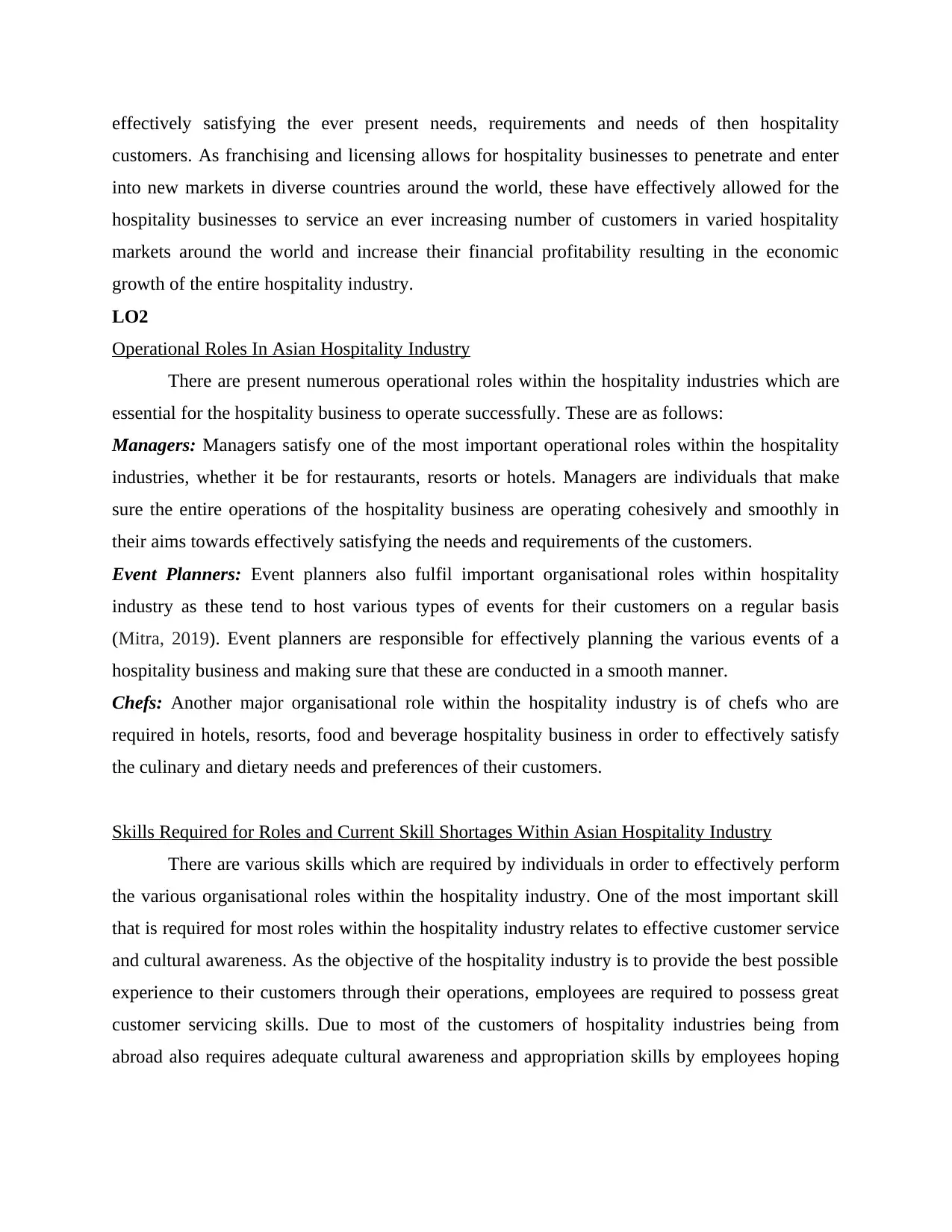
effectively satisfying the ever present needs, requirements and needs of then hospitality
customers. As franchising and licensing allows for hospitality businesses to penetrate and enter
into new markets in diverse countries around the world, these have effectively allowed for the
hospitality businesses to service an ever increasing number of customers in varied hospitality
markets around the world and increase their financial profitability resulting in the economic
growth of the entire hospitality industry.
LO2
Operational Roles In Asian Hospitality Industry
There are present numerous operational roles within the hospitality industries which are
essential for the hospitality business to operate successfully. These are as follows:
Managers: Managers satisfy one of the most important operational roles within the hospitality
industries, whether it be for restaurants, resorts or hotels. Managers are individuals that make
sure the entire operations of the hospitality business are operating cohesively and smoothly in
their aims towards effectively satisfying the needs and requirements of the customers.
Event Planners: Event planners also fulfil important organisational roles within hospitality
industry as these tend to host various types of events for their customers on a regular basis
(Mitra, 2019). Event planners are responsible for effectively planning the various events of a
hospitality business and making sure that these are conducted in a smooth manner.
Chefs: Another major organisational role within the hospitality industry is of chefs who are
required in hotels, resorts, food and beverage hospitality business in order to effectively satisfy
the culinary and dietary needs and preferences of their customers.
Skills Required for Roles and Current Skill Shortages Within Asian Hospitality Industry
There are various skills which are required by individuals in order to effectively perform
the various organisational roles within the hospitality industry. One of the most important skill
that is required for most roles within the hospitality industry relates to effective customer service
and cultural awareness. As the objective of the hospitality industry is to provide the best possible
experience to their customers through their operations, employees are required to possess great
customer servicing skills. Due to most of the customers of hospitality industries being from
abroad also requires adequate cultural awareness and appropriation skills by employees hoping
customers. As franchising and licensing allows for hospitality businesses to penetrate and enter
into new markets in diverse countries around the world, these have effectively allowed for the
hospitality businesses to service an ever increasing number of customers in varied hospitality
markets around the world and increase their financial profitability resulting in the economic
growth of the entire hospitality industry.
LO2
Operational Roles In Asian Hospitality Industry
There are present numerous operational roles within the hospitality industries which are
essential for the hospitality business to operate successfully. These are as follows:
Managers: Managers satisfy one of the most important operational roles within the hospitality
industries, whether it be for restaurants, resorts or hotels. Managers are individuals that make
sure the entire operations of the hospitality business are operating cohesively and smoothly in
their aims towards effectively satisfying the needs and requirements of the customers.
Event Planners: Event planners also fulfil important organisational roles within hospitality
industry as these tend to host various types of events for their customers on a regular basis
(Mitra, 2019). Event planners are responsible for effectively planning the various events of a
hospitality business and making sure that these are conducted in a smooth manner.
Chefs: Another major organisational role within the hospitality industry is of chefs who are
required in hotels, resorts, food and beverage hospitality business in order to effectively satisfy
the culinary and dietary needs and preferences of their customers.
Skills Required for Roles and Current Skill Shortages Within Asian Hospitality Industry
There are various skills which are required by individuals in order to effectively perform
the various organisational roles within the hospitality industry. One of the most important skill
that is required for most roles within the hospitality industry relates to effective customer service
and cultural awareness. As the objective of the hospitality industry is to provide the best possible
experience to their customers through their operations, employees are required to possess great
customer servicing skills. Due to most of the customers of hospitality industries being from
abroad also requires adequate cultural awareness and appropriation skills by employees hoping
⊘ This is a preview!⊘
Do you want full access?
Subscribe today to unlock all pages.

Trusted by 1+ million students worldwide
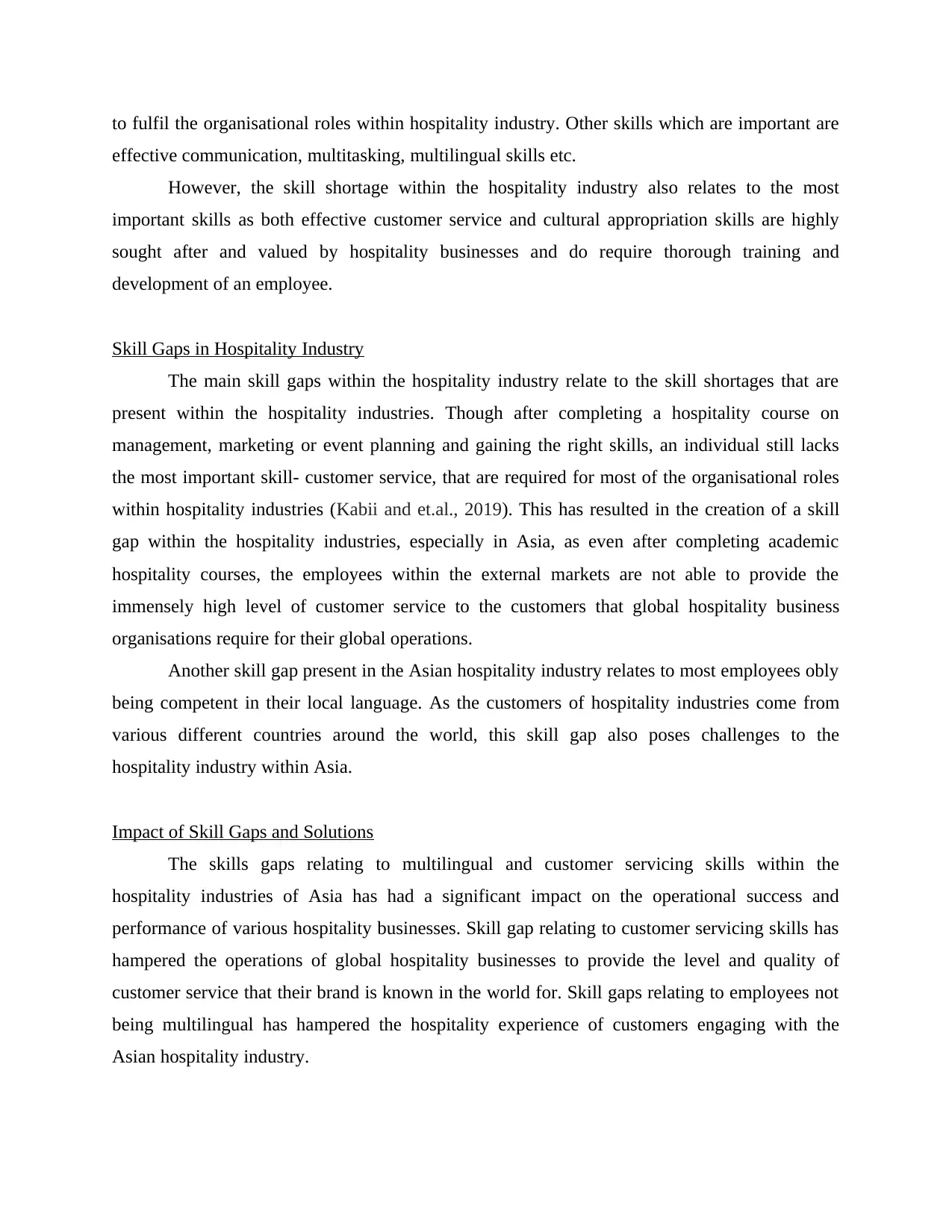
to fulfil the organisational roles within hospitality industry. Other skills which are important are
effective communication, multitasking, multilingual skills etc.
However, the skill shortage within the hospitality industry also relates to the most
important skills as both effective customer service and cultural appropriation skills are highly
sought after and valued by hospitality businesses and do require thorough training and
development of an employee.
Skill Gaps in Hospitality Industry
The main skill gaps within the hospitality industry relate to the skill shortages that are
present within the hospitality industries. Though after completing a hospitality course on
management, marketing or event planning and gaining the right skills, an individual still lacks
the most important skill- customer service, that are required for most of the organisational roles
within hospitality industries (Kabii and et.al., 2019). This has resulted in the creation of a skill
gap within the hospitality industries, especially in Asia, as even after completing academic
hospitality courses, the employees within the external markets are not able to provide the
immensely high level of customer service to the customers that global hospitality business
organisations require for their global operations.
Another skill gap present in the Asian hospitality industry relates to most employees obly
being competent in their local language. As the customers of hospitality industries come from
various different countries around the world, this skill gap also poses challenges to the
hospitality industry within Asia.
Impact of Skill Gaps and Solutions
The skills gaps relating to multilingual and customer servicing skills within the
hospitality industries of Asia has had a significant impact on the operational success and
performance of various hospitality businesses. Skill gap relating to customer servicing skills has
hampered the operations of global hospitality businesses to provide the level and quality of
customer service that their brand is known in the world for. Skill gaps relating to employees not
being multilingual has hampered the hospitality experience of customers engaging with the
Asian hospitality industry.
effective communication, multitasking, multilingual skills etc.
However, the skill shortage within the hospitality industry also relates to the most
important skills as both effective customer service and cultural appropriation skills are highly
sought after and valued by hospitality businesses and do require thorough training and
development of an employee.
Skill Gaps in Hospitality Industry
The main skill gaps within the hospitality industry relate to the skill shortages that are
present within the hospitality industries. Though after completing a hospitality course on
management, marketing or event planning and gaining the right skills, an individual still lacks
the most important skill- customer service, that are required for most of the organisational roles
within hospitality industries (Kabii and et.al., 2019). This has resulted in the creation of a skill
gap within the hospitality industries, especially in Asia, as even after completing academic
hospitality courses, the employees within the external markets are not able to provide the
immensely high level of customer service to the customers that global hospitality business
organisations require for their global operations.
Another skill gap present in the Asian hospitality industry relates to most employees obly
being competent in their local language. As the customers of hospitality industries come from
various different countries around the world, this skill gap also poses challenges to the
hospitality industry within Asia.
Impact of Skill Gaps and Solutions
The skills gaps relating to multilingual and customer servicing skills within the
hospitality industries of Asia has had a significant impact on the operational success and
performance of various hospitality businesses. Skill gap relating to customer servicing skills has
hampered the operations of global hospitality businesses to provide the level and quality of
customer service that their brand is known in the world for. Skill gaps relating to employees not
being multilingual has hampered the hospitality experience of customers engaging with the
Asian hospitality industry.
Paraphrase This Document
Need a fresh take? Get an instant paraphrase of this document with our AI Paraphraser
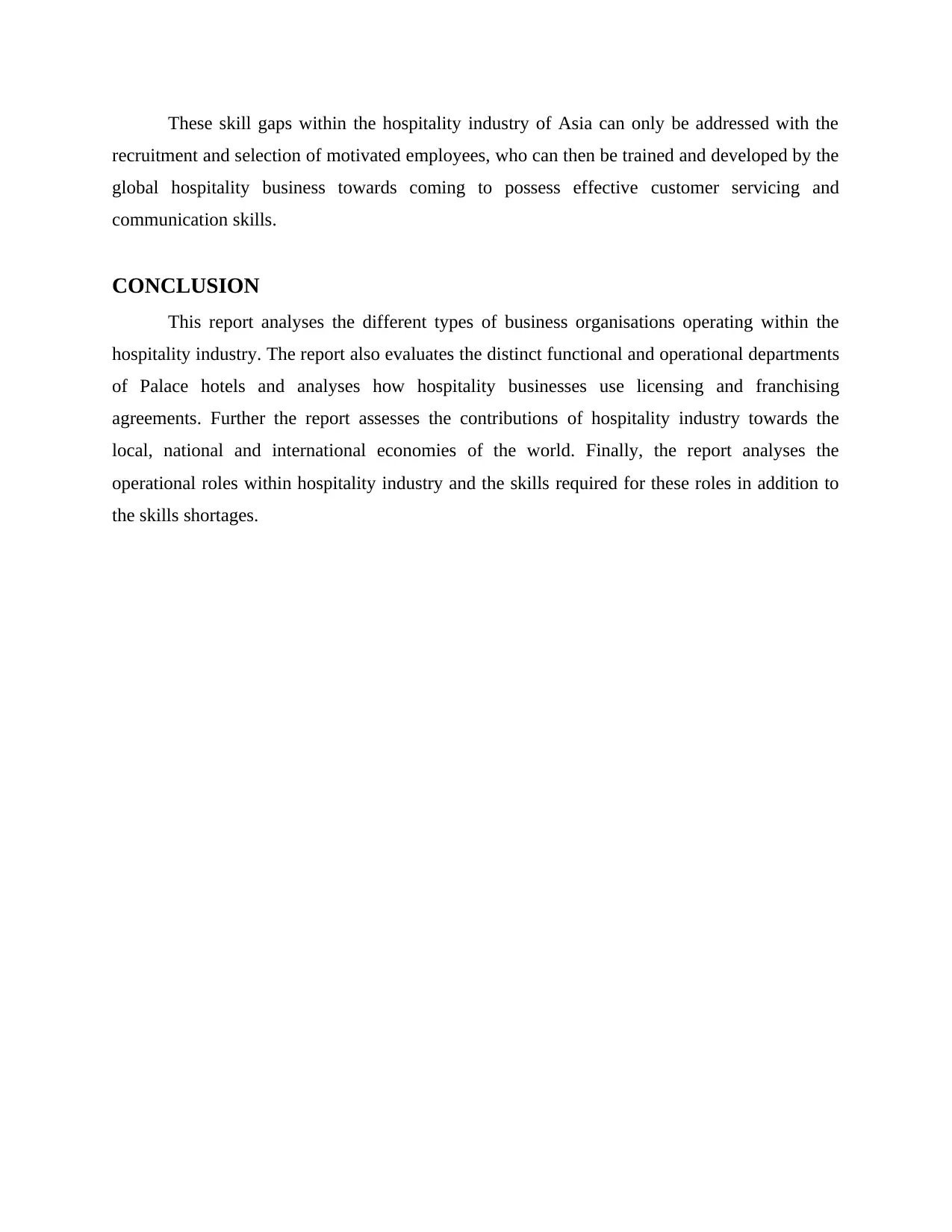
These skill gaps within the hospitality industry of Asia can only be addressed with the
recruitment and selection of motivated employees, who can then be trained and developed by the
global hospitality business towards coming to possess effective customer servicing and
communication skills.
CONCLUSION
This report analyses the different types of business organisations operating within the
hospitality industry. The report also evaluates the distinct functional and operational departments
of Palace hotels and analyses how hospitality businesses use licensing and franchising
agreements. Further the report assesses the contributions of hospitality industry towards the
local, national and international economies of the world. Finally, the report analyses the
operational roles within hospitality industry and the skills required for these roles in addition to
the skills shortages.
recruitment and selection of motivated employees, who can then be trained and developed by the
global hospitality business towards coming to possess effective customer servicing and
communication skills.
CONCLUSION
This report analyses the different types of business organisations operating within the
hospitality industry. The report also evaluates the distinct functional and operational departments
of Palace hotels and analyses how hospitality businesses use licensing and franchising
agreements. Further the report assesses the contributions of hospitality industry towards the
local, national and international economies of the world. Finally, the report analyses the
operational roles within hospitality industry and the skills required for these roles in addition to
the skills shortages.
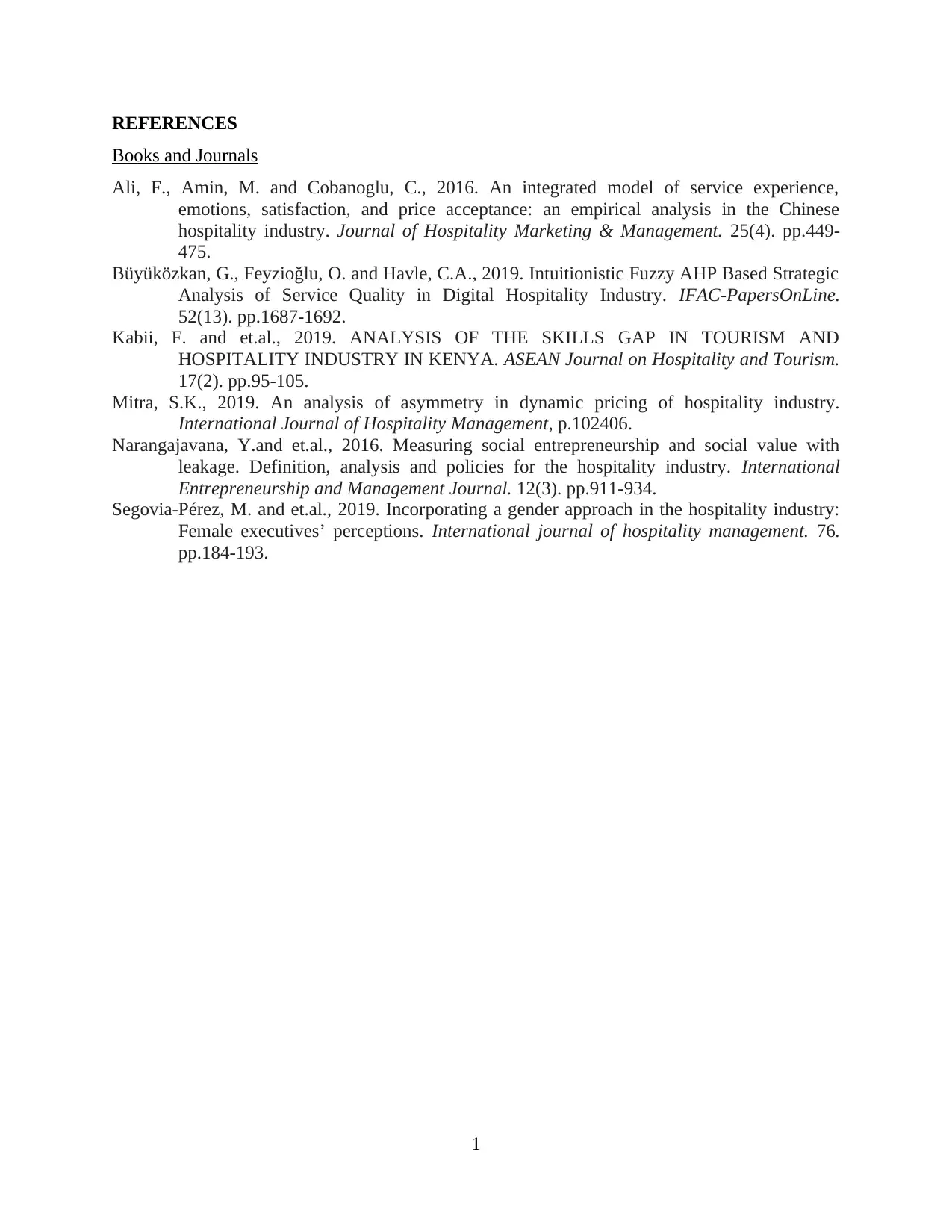
REFERENCES
Books and Journals
Ali, F., Amin, M. and Cobanoglu, C., 2016. An integrated model of service experience,
emotions, satisfaction, and price acceptance: an empirical analysis in the Chinese
hospitality industry. Journal of Hospitality Marketing & Management. 25(4). pp.449-
475.
Büyüközkan, G., Feyzioğlu, O. and Havle, C.A., 2019. Intuitionistic Fuzzy AHP Based Strategic
Analysis of Service Quality in Digital Hospitality Industry. IFAC-PapersOnLine.
52(13). pp.1687-1692.
Kabii, F. and et.al., 2019. ANALYSIS OF THE SKILLS GAP IN TOURISM AND
HOSPITALITY INDUSTRY IN KENYA. ASEAN Journal on Hospitality and Tourism.
17(2). pp.95-105.
Mitra, S.K., 2019. An analysis of asymmetry in dynamic pricing of hospitality industry.
International Journal of Hospitality Management, p.102406.
Narangajavana, Y.and et.al., 2016. Measuring social entrepreneurship and social value with
leakage. Definition, analysis and policies for the hospitality industry. International
Entrepreneurship and Management Journal. 12(3). pp.911-934.
Segovia-Pérez, M. and et.al., 2019. Incorporating a gender approach in the hospitality industry:
Female executives’ perceptions. International journal of hospitality management. 76.
pp.184-193.
1
Books and Journals
Ali, F., Amin, M. and Cobanoglu, C., 2016. An integrated model of service experience,
emotions, satisfaction, and price acceptance: an empirical analysis in the Chinese
hospitality industry. Journal of Hospitality Marketing & Management. 25(4). pp.449-
475.
Büyüközkan, G., Feyzioğlu, O. and Havle, C.A., 2019. Intuitionistic Fuzzy AHP Based Strategic
Analysis of Service Quality in Digital Hospitality Industry. IFAC-PapersOnLine.
52(13). pp.1687-1692.
Kabii, F. and et.al., 2019. ANALYSIS OF THE SKILLS GAP IN TOURISM AND
HOSPITALITY INDUSTRY IN KENYA. ASEAN Journal on Hospitality and Tourism.
17(2). pp.95-105.
Mitra, S.K., 2019. An analysis of asymmetry in dynamic pricing of hospitality industry.
International Journal of Hospitality Management, p.102406.
Narangajavana, Y.and et.al., 2016. Measuring social entrepreneurship and social value with
leakage. Definition, analysis and policies for the hospitality industry. International
Entrepreneurship and Management Journal. 12(3). pp.911-934.
Segovia-Pérez, M. and et.al., 2019. Incorporating a gender approach in the hospitality industry:
Female executives’ perceptions. International journal of hospitality management. 76.
pp.184-193.
1
⊘ This is a preview!⊘
Do you want full access?
Subscribe today to unlock all pages.

Trusted by 1+ million students worldwide
1 out of 9
Related Documents
Your All-in-One AI-Powered Toolkit for Academic Success.
+13062052269
info@desklib.com
Available 24*7 on WhatsApp / Email
![[object Object]](/_next/static/media/star-bottom.7253800d.svg)
Unlock your academic potential
Copyright © 2020–2026 A2Z Services. All Rights Reserved. Developed and managed by ZUCOL.




